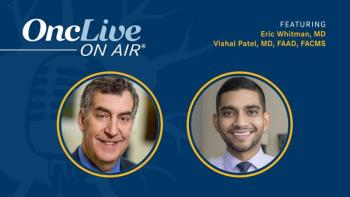
Ongoing Research Advances Equity and Precision Oncology Through Tissue-Agnostic Therapies: With Chandler Park, MD, and Vivek Subbiah, MD
In this Oncology Unplugged episode, Dr. Chandler Park and Dr. Vivek Subbiah discuss advancements in precision oncology, next-gen sequencing, and tissue-agnostic therapies.
In this episode of the Oncology Unplugged series, Chandler Park, MD, a genitourinary medical oncologist at Norton Cancer Institute in Louisville, Kentucky, hosted a conversation with Vivek Subbiah, MD, a medical oncologist and chief of Early-Phase Drug Development at Sarah Cannon Research Institute in Nashville, Tennessee. Dr Subbiah, an internationally recognized expert, discussed advancements in precision oncology, emphasizing the effects of next-generation sequencing and tissue-agnostic therapies on personalized cancer treatment.
Dr Subbiah highlighted the transformation in genome sequencing that has taken place since the Human Genome Project, noting the reduction in sequencing costs from $3.3 billion to potentially $1 per genome. He explained how this evolution supports the expansion of precision oncology by making genomic testing accessible across diverse health care settings. Another key focus was on the evolving landscape of tissue-agnostic therapies, a novel approach that targets cancers based on shared molecular markers rather than the tumor’s origin. Dr Subbiah detailed the timeline of the FDA's tissue-agnostic drug approvals, beginning with pembrolizumab (Keytruda) for microsatellite instability–high or mismatch repair–deficient cancers, followed by inhibitors of NTRK mutations, BRAF mutations, and RET gene fusions.
The conversation concluded with Dr Subbiah’s vision for the future of precision oncology, where comprehensive molecular profiling, including proteomics and metabolomics, will become routine. He called for faster drug development and greater integration of genomic testing in standard care, predicting that by 2050, precision medicine will encompass numerous tissue-agnostic therapies, enabling highly personalized and effective treatments across all patient demographics.





































